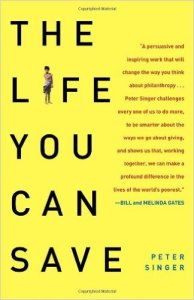Submitted by Peter Denison
 Peter Singer is a well known philosopher at Princeton University, whose moral system is built on Utilitarianism. Starting out with the proposition that all human lives are of equal value he holds that everyone whose income is above the average income of everybody should give away all of that surplus to help those who have less. He quotes Jesus who told a rich young man to sell all he had and give it to the poor. He does not quote Kant whose categorical imperative states that one should act in such a way that one can will that that act be a universal principle. The problem that would arise is if everybody did sell, who would be left to buy the stuff? Obviously chaos. Singer admits that even he does not give away that much. (I have read previously that he does give away 20% of his income.)
Peter Singer is a well known philosopher at Princeton University, whose moral system is built on Utilitarianism. Starting out with the proposition that all human lives are of equal value he holds that everyone whose income is above the average income of everybody should give away all of that surplus to help those who have less. He quotes Jesus who told a rich young man to sell all he had and give it to the poor. He does not quote Kant whose categorical imperative states that one should act in such a way that one can will that that act be a universal principle. The problem that would arise is if everybody did sell, who would be left to buy the stuff? Obviously chaos. Singer admits that even he does not give away that much. (I have read previously that he does give away 20% of his income.)
He then asks why people don’t give. Some reasons or excuses are to question how much one person’s gift can help. Many studies show that if there is one child with a name starving or in need of a life saving operation, many people are moved to give. An article describing thousands of children who need the same kind of help elicits a much weaker response, and even mentioning a second child means less is given. The feeling seems to be that there is so great a need that one’s donation is just a drop in the bucket. Singer reasonably points out the fallacy in that argument. Whether one gives for one named child, or for someone whom one will never know, there is one child who will live, one set of parents who will be grateful. Except that the child’s name is unknown, there really is no difference.
He also deals with the question, will one’s donation really help the child, or will it be wasted in inefficiency and/or corruption? Singer takes that question seriously. Charities now have statistics on how much of the donation goes to expenses. But a charity has to do enough research to know what is the best way to help, and should spend some money on research. One organization that he mentions is Oxfam. The World Wide Fistula Fund is able to repair an obstetric fistula for about $450, a simple operation that can allow a woman to participate in society without producing foul smells. In some Third World villages just building simple toilets will prevent a lot of pollution and save many lives.
Many people comment on the billions our government sends in foreign aid, and those countries often show no benefit. But that aid is mainly military and food aid often is tied to buying food from our country. Cheap grain coming in to one of those countries will undersell the local farmers, putting them out of business, and thus undermining the country’s economy. An independent NGO can do more good for less money because it doesn’t have to be tied to our country’s foreign policy. Singer’s researches have shown that even small donations if everybody gave, could solve the problems of world hunger, poverty, and the diseases which no longer affect developed countries.
How much should people give? Singer has backed away from the absolutism presented in the opening paragraph. He believes that a lower amount of giving can accomplish his goals. He comes up with a graduated table similar to those on our IRS forms. Based on income he says nothing on our first $50,000, 5% of earnings up to $100,005. In condensed form he writes” “5% of the first $148,000, 12% of the next $235,000, 15% of the next $217,000, 20% of the next $1.3 million, 25% of the next $8.8 million, and 33.33% of the remainder.” He speaks approvingly of super rich men like Bill Gates who give away more than half of their fortunes. (At least in this context he makes no criticism of the ruthlessness which inevitably goes with acquiring these huge fortunes.) Not all tax deductible charities can count in the above figures. Donations to orchestras, colleges, libraries, are nice, but they don’t help the hungry and sick. Nor do more than a small percentage of one’s contributions to one’s church or even to the Boston Ethical Community. Singer’s challenge calls for a response from all of us.
